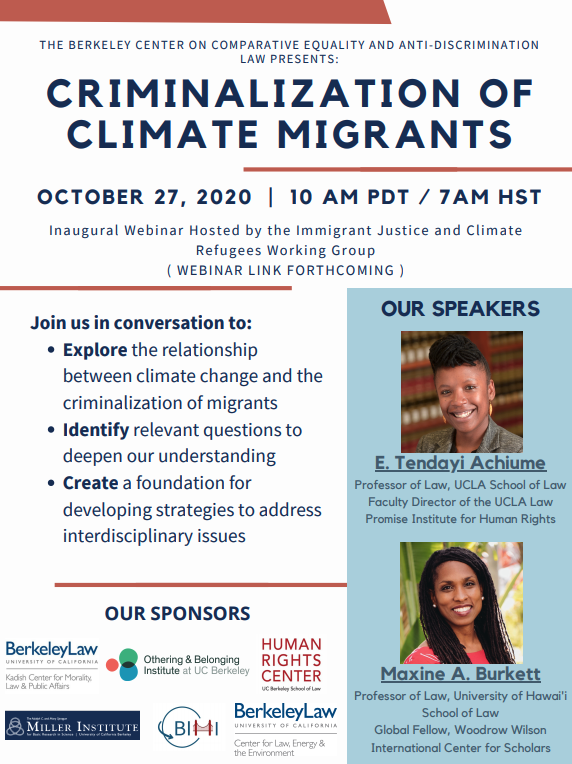Criminalization of Climate Migrants
Tuesday, October 27, 2020
10am PDT / 7am HST
Webinar (details to follow)
Event Contact: Carrie Rosenbaum, crosenbaum@berkeley.edu
Speakers:
E. Tendayi Achiume, Professor of Law, UCLA Law
E. Tendayi Achiume is Professor of Law at UCLA School of Law, and Faculty Director of the UCLA Law Promise Institute for Human Rights. She is also a Research Associate with the African Centre for Migration and Society at the University of Witwatersrand. The current focus of her work is the global governance of racism and xenophobia; and the legal and ethical implications of colonialism for contemporary international migration. More generally, her research and teaching interests lie in international human rights law, international refugee law, international migration, and property.
Maxine A. Burkett, Professor of Law, University of Hawai’i School of Law
Maxine Burkett is a Professor of Law at the William S. Richardson School of Law and a Global Fellow at the Woodrow Wilson International Center for Scholars. An expert in the law and policy of climate change, she has written extensively in diverse areas of climate change law with a particular focus on climate justice—exploring policy responses to climate change’s impacts on vulnerable communities in the United States and globally. Professor Burkett has presented her research throughout the United States and in West Africa, the Asia-Pacific region, Europe, and the Caribbean. She has been cited in numerous news and policy outlets, including BBC Radio, the New York Times, the Washington Post, International Business Times, and Nature Climate Change.
Description
There are two seemingly disparate trends building momentum across the globe that have yet to be examined in relation to one another. The first is climate change. Acknowledgment and awareness of climate change has steadily increased, although with more controversy in some nations than others. The second trend is the use of prisons to deter migration. At the same time that leaders are exploring ways of addressing climate change, countries that have tended to receive more of the world’s migrants are increasingly relying on criminalization and imprisonment to deter migration. These two challenges may be related, and each has its own racial justice and equality implications.
The Immigrant Justice & Climate Refugee Working Group’s inaugural event will bring together speakers in the fields of immigration law and environmental law and climate migration to initiate a conversation that brings these two important topics together. This interdisciplinary conversation will explore the potential relationship between these problems and to create a foundation to inform the development of strategies to simultaneously address these problems and further equality, immigration justice, and solutions to climate change.





